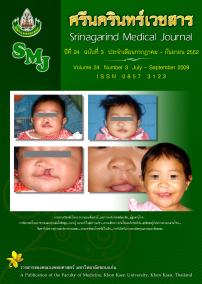ThaiScience
ThaiScience
SRINAGARIND MEDICAL JOURNAL
Volume 36, No. 02, Month MARCH, Year 2021, Pages 142 - 148
Effect of hesperidin on memory impairments induced by valproic acid in rats
Soraya Kaewngam, Tanaporn Anosri, Ram Prajit, Kornrawee Suwannakot, Nataya Sritawan, Anusara Aranarochana, Apiwat Sirichoat, Wanassanan Pannangrong, Jariya Umka Welbat
Abstract Download PDF
Background and objective: Decreasing of neurogenesis in the subgranular zone (SGZ) of the dentate gyrus (DG) in the hippocampus is linked to memory deficits. In animal studies, treatment with valproic acid (VPA) impairs neurogenesis in the SGZ resulting in memory impairment. Hesperidin (Hsd), a plant flavanone, is a natural extract, which enhances learning and memory. Therefore, the aim of this study was to investigate the effect of Hsd on memory impairment in rats induced by VPA. Methods: Male Sprague Dawley rats were divided into 4 groups (6 animals/group) including vehicle, VPA, Hsd and VPA+Hsd groups. VPA (300 mg/kg) was administrated by intraperitoneal (i.p.) injection twice dai ly for 14 days. Hsd (100 mg/kg/day) was administrated by oral gavage once a day for 21 days. Body weight was weighed and recorded every day. Three days after the treatment, rats were tested for memory using the novel object location (NOL) and novel object recognition (NOR) tests. Results: The results showed that the body weight and total exploration time were not significantly different among groups in both NOL and NOR tests (p>0.05). In the NOL test, rats in the vehicle, Hsd and VPA+Hsd groups could significantly discriminate between the novel and familiar locations (p<0.05). In the NOR test, similarly, rats in the vehicle, Hsd and VPA+Hsd groups could significantly discriminate between the novel and familiar objects (p<0.05). In contrast, rats in the VPA group could not significantly performed in both tests. Conclusion: This study demonstrates that hesperidin could improve the memory impairments induced by valproic acid.
Keywords
Hesperidin; Valproic acid; Memory impairmentSRINAGARIND MEDICAL JOURNAL
Published by : Faculty of Medicine, Khon Kaen University
Contributions welcome at : http://www.smj.ejnal.com/e-journal/journal/index.php
